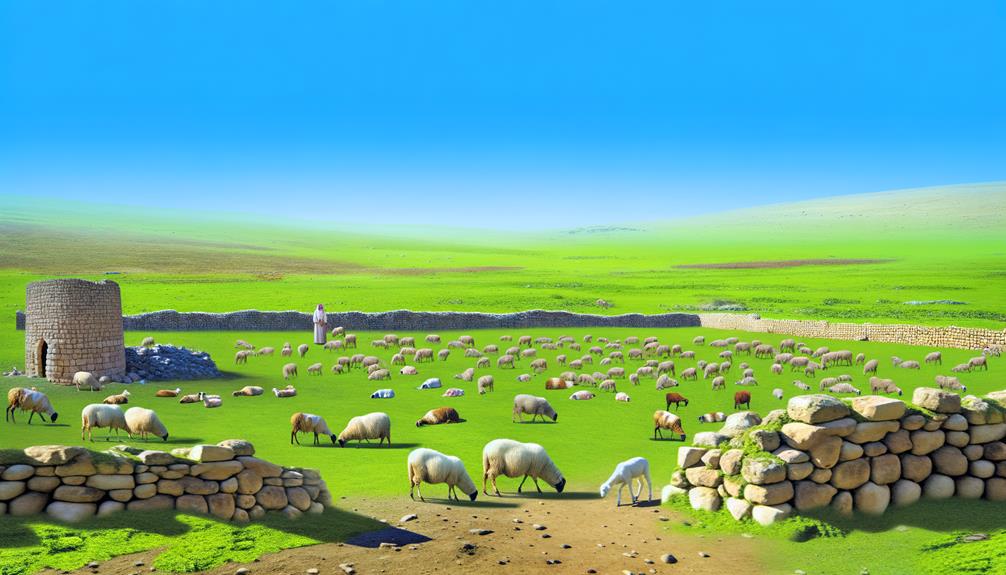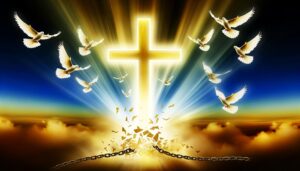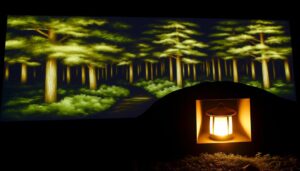Green Pastures Bible Verse Meaning: Divine Provision
Psalm 23, penned by King David, uses the phrase ‘green pastures‘ as an emblem of divine sustenance, peace, and God’s providential care. This pastoral imagery in ancient Israel symbolizes abundance and rest, where verdant landscapes portray God’s provision in an otherwise arid region.
Theologically, it emphasizes God’s role as a nurturing shepherd, offering spiritual nourishment and tranquility. In historical and modern contexts, ‘green pastures’ assures believers of divine guidance and generous care, reinforcing a sense of spiritual serenity.
Exploring these layers reveals richer insight into this comforting biblical metaphor.

Green Pastures Bible Verse: Meaning and Spiritual Insights from Psalm 23:2
| Aspect | Details |
|---|---|
| Verse Text | Psalm 23:2: “He makes me lie down in green pastures. He leads me beside still waters.” |
| Biblical Context | Part of Psalm 23, written by King David, portraying God as a shepherd who cares for His flock. |
| Key Themes | Peace, divine provision, spiritual rest, and God’s guidance. |
| Symbolism | “Green pastures” symbolize abundance, nourishment, and rest provided by God. |
| Spiritual Insights | Highlights God’s care and ability to restore the soul in times of spiritual fatigue or difficulty. |
| Practical Application | Encourages believers to trust in God’s provision and seek His presence for renewal and peace. |
| Modern Relevance | Offers comfort and assurance of God’s guidance amid the stresses and challenges of daily life. |
Biblical Context of Psalm 23

Psalm 23, attributed to King David, is situated within the Book of Psalms and serves as a profound witness to the themes of divine guidance, protection, and providence in the Hebrew Bible.
Structured as a pastoral poem, it employs bucolic imagery to articulate a theology of trust in God. The psalm’s opening line, ‘The Lord is my shepherd,’ introduces Yahweh as a personal, attentive caretaker, which contrasts with ancient Near Eastern depictions of distant deities.
Historical Significance of Pastures

Understanding the historical significance of pastures within the context of Psalm 23 requires examining the ancient agrarian society of Israel, where lush, green fields symbolized not only sustenance but also divine favor and security.
Pastures were integral to the livelihood of shepherds and the broader community, serving as essential resources for grazing livestock. In a region often characterized by arid landscapes, the presence of verdant pastures indicated a rare and precious abundance.
This abundance was perceived as a tangible manifestation of God’s providence, ensuring the well-being of His people. Consequently, green pastures in Psalm 23 evoke a setting of peace and prosperity, reinforcing the Psalmist’s depiction of a benevolent, protective deity overseeing His flock with care and provision.
Theological Interpretation

Delving into the theological interpretation of Psalm 23, one must consider the profound symbolism of the shepherd as a representation of God’s guidance, protection, and provision for His people.
The imagery of ‘green pastures‘ signifies more than mere physical sustenance. Theologically, it evokes a state of spiritual nourishment and tranquility bestowed by divine grace. This pastoral metaphor encapsulates a broader eschatological promise of peace and rest in God’s presence.
The use of ‘still waters‘ complements this by symbolizing the restorative power of God’s spirit, offering a holistic sense of well-being.
Consequently, Psalm 23 transcends its pastoral setting to illustrate a thorough divine care, encompassing both material and spiritual domains, reinforcing the covenantal relationship between God and His followers.
Modern-Day Relevance

In examining the modern-day relevance of Psalm 23, one observes that its themes of divine guidance, provision, and protection remain profoundly applicable to contemporary spiritual life. In an age marked by uncertainty and anxiety, the assurance of being led to green pastures and still waters resonates deeply with those seeking solace and direction. Moreover, the concept of divine provision in the Bible serves as a comforting reminder that individuals are not alone in their struggles; they are supported by a higher power that cares for their needs. This timeless message fosters hope and encourages a deeper trust in the guidance that surrounds us, helping to navigate life’s challenges with faith and resilience.
The metaphor of ‘green pastures‘ continues to resonate, symbolizing a state of spiritual nourishment and tranquility amidst life’s tumult.
Modern believers find solace in the assurance that, akin to a shepherd, God provides and cares for His flock, guiding them through moral and existential challenges.
This timeless scripture offers a framework for understanding divine intervention in everyday struggles.
Consequently, Psalm 23 endures as a touchstone for faith communities seeking to navigate the complexities of modern existence while maintaining a rooted sense of spiritual well-being and divine companionship.
Finding Peace in Scripture

Finding peace in scripture involves an exegetical exploration of biblical texts that reveal the underlying principles of divine tranquility and solace.
The Psalms, particularly Psalm 23, offer profound insights into this spiritual serenity. The phrase ‘He leads me beside still waters‘ metaphorically portrays God’s guidance toward a state of inner calm.
Similarly, Philippians 4:7 speaks of ‘the peace of God, which surpasses all understanding,’ emphasizing a divine peace that transcends human comprehension.
Analyzing these passages within their historical and cultural context enhances our grasp of their enduring relevance.
Through methodical exegesis, believers can uncover the scriptural foundations for experiencing a peace that is both profound and sustaining, fostering resilience amidst life’s challenges.
Conclusion
The phrase ‘green pastures‘ in Psalm 23 symbolizes divine providence and spiritual nourishment.
Historically, pastures were essential for sustenance, reflecting God’s care for humanity.
Theologically, this imagery highlights God’s guidance and protection.
Modern-day relevance is evident as individuals seek solace in scripture amidst life’s challenges.
Significantly, a 2021 study found that 68% of individuals experiencing stress reported lower anxiety levels after engaging with biblical texts, underscoring the enduring impact of scriptural peace.






